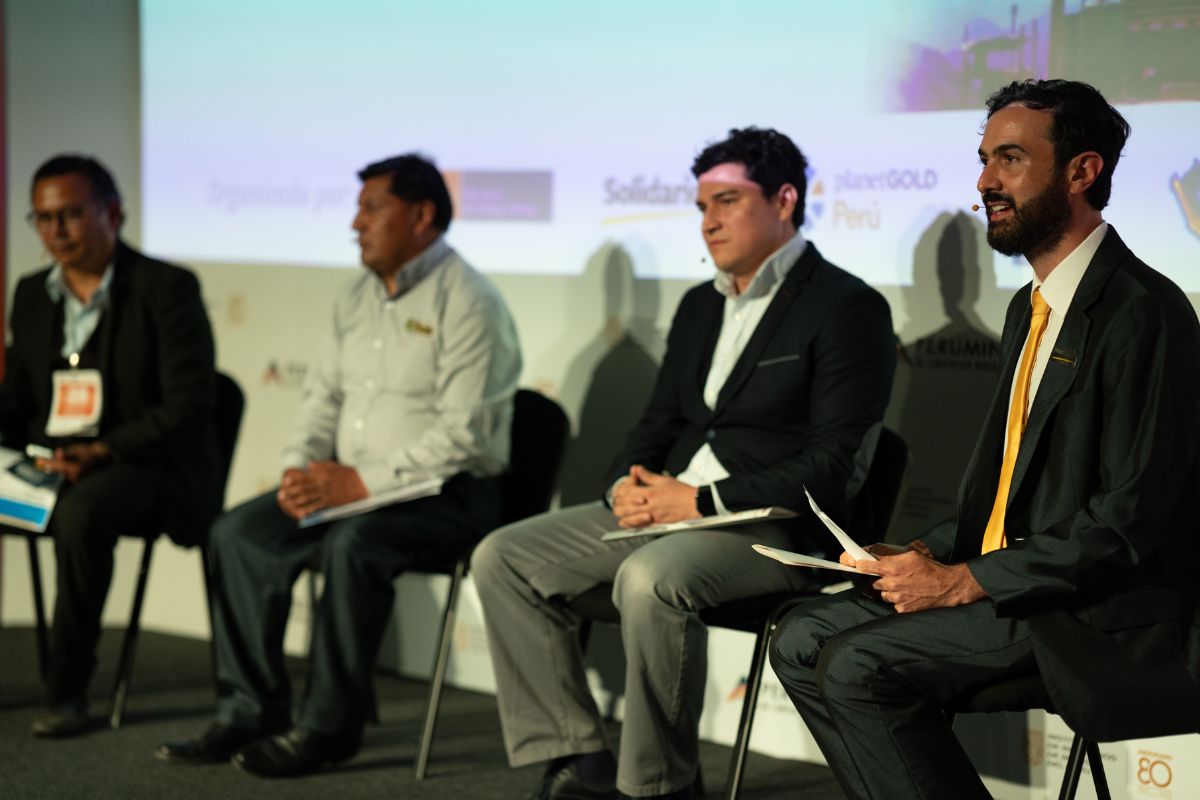PERUMIN is a widely recognized annual event in Peru that showcases advances in the mining sector on a national and global scale. The event brings together state ministers, mining companies, international organizations, embassy representatives, and miners.
For 34 years, the PERUMIN has focused primarily on large-scale mining, however, beginning in 2022, 16 artisanal and small-scale mining (ASM) delegations from eight regions in Peru were invited. The shift reflects a growing recognition of ASM’s potential, and the focus on success stories in the sector serves as a powerful reminder of how formalization can contribute to a reduction in illegal mining.
By formally engaging with ASM miners and addressing their concerns, PERUMIN is helping to change perceptions of ASM among influential actors, such as financial institutions and government agencies, who can play a crucial role in its formalization. This aligns well with Peru’s new National Policy for Small-Scale Mining and Artisanal Mining, which aims to create and improve services that foster the inclusion and sustainability of ASM in the formal economy.
Making Financial Inclusion of ASM a Key Point on the Agenda
Access to formal banking and finance is critical for the formalization of ASM, as it is needed to improve operations and boost productive capacity. Without support, numerous risks will persist, including illegal mining activities, increased vulnerability of communities, diminished tax revenues, and negative impacts on the environment, health, governance, and labor safety.
Mauricio Winkelried, Solidaridad mining manager in Latin America, moderated the panel ‘Promoting Financial Inclusion in Small-Scale and Artisanal Mining: Progress and Challenges,’ which was co-organized with the United Nations Development Programme (UNDP) through the planetGOLD Peru project, and the Ministry of Energy and Mines through the General Directorate of Mining Formalization.
BARRIERS TO FINANCIAL INCLUSION
In the panel, Jorge Álvarez, Environmental Sustainability Program Officer at UNDP, addressed existing barriers to financial inclusion, referring to a study published in 2022 by planetGOLD. The study reveals that only 10% of artisanal miners utilize loans from financial institutions, while 87% of transactions are conducted in cash. It also shows that nearly 60% of miners do not issue receipts for their activities. Moreover, access to additional financial services, such as insurance and pension systems, is virtually nonexistent in artisanal mining
The situation is even more critical for ‘pallaqueras’, women miners that pick gold manually on the slope of mines. They face inadequate recognition and lack specific national regulations that make their work easier. This forces them to operate in a gray area between informality and illegality.
Álvarez highlighted that one major barrier is that financial institutions have limited knowledge about the differences between artisanal mining, mining in the process of being formalized, and illegal mining. Also, few know the scope of the state-driven formalization process. This lack of awareness often discourages the formal banking system from interacting with ASM.
Showing Examples of Financial Inclusion
The panel introduced creative solutions to extend access to formal banking. Edgar Mamani, President of the Mining Cooperative Central of San Antonio de Poto de Ananea (CECOMSAP) shared an inspiring example that relies on Savings and Credit Cooperatives.
Five years ago, the CECOMSAP established a Savings and Credit Cooperative (COOPAC) to pool savings from over 340 miner members, which created a fund of approximately 3 million soles (around USD 780,000). Since then, COOPAC has become a vital resource for members, granting them access to current accounts and financial services that were beyond their reach. The savings cooperative has grown to 1,500 members and operates under the rigorous supervision of the Superintendence of Banking and Insurance, underscoring a high level of formality and commitment. Moreover, this mechanism enables affiliated cooperatives to meet the transparency and traceability requirements that the export markets served by CECOMSAP demand.
Sergio Samaniego, General Manager of the company ‘Minera Orex’, shared how they partnered with a financial institution to design and launch a specific credit product for artisanal miners undergoing the formalization process within their concessions. This product, called the ‘Artisanal Mining Entrepreneurial Loan‘, provides loans to purchase fixed assets that enhance productivity, and allows repayment in kind, through the minerals the miners sell to the company, sparing them from traveling to bank branches.
Minister of Energy and Mines, Oscar Vera Gargurevich, delivered the closing remarks at the panel addressing public credit initiatives such as ‘Crece Minero’ (Grow Miner) and ‘Mujer Pallaquera’ (Pallaquera Woman), which were recently launched by the Caja Ica. He also highlighted the collaboration with the National Bank to streamline the process that will allow all miners engaged in the formalization process to open savings and current accounts. Finally, the Minister previewed ongoing considerations for a national guarantee fund (to cover potential losses or risks associated) that could encourage and support the integration of ASM miners into the formal financial system.
The presence of artisanal and small-scale miners in public events, like PERUMIN, is crucial for fomenting dialogue and exchanging ideas so that public and private decision-makers can develop the best possible policies. This example can also inspire civil society to continue driving, systematizing, and developing more spaces like this.
ABOUT RECLAIM SUSTAINABILITY!
RECLAIM Sustainability! is a five-year programme implemented in strategic partnership with the Netherlands Ministry of Foreign Affairs. This global programme is active across 17 countries in cocoa, coffee, tea, palm oil, cotton & textiles, and gold; with a special focus on the local food systems in Africa.
In this programme, we strive for a radical re-balancing of power and genuine transformation that benefits the smallholder farmers, workers and miners at the beginning of the value chains. After all, there can be no genuine sustainability when the people who produce the goods consumed by us all continue living in poverty; when natural resources are not managed sustainably; civic space in many countries is limited or even continues to shrink, and the working conditions of millions of producers are abject.

